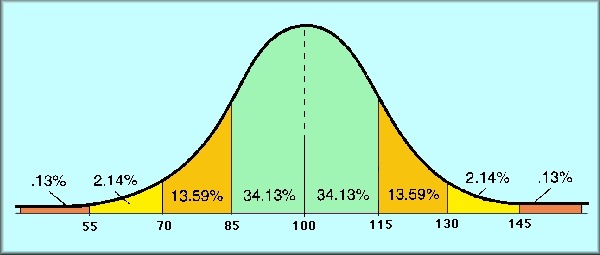|
Ψ Children’s brains develop as rapidly as their bodies do during the school years. Humans seem to have many forms of intelligence, most of which would not be measured by the narrow spectrum of current IQ tests.
• Multiple Intelligence Theories
Ψ Sternberg's 3 Intelligences:
 Academic - as measured by IQ & achievement tests Academic - as measured by IQ & achievement tests
 Creative - as evidenced by imaginative endeavors Creative - as evidenced by imaginative endeavors
 Practical - as seen in everyday interactions Practical - as seen in everyday interactions
Sternburg's Triarchic theory of intelligence consists of three subtheories: (1) the componential (academic) subtheory which outlines the structures and mechanisms that underlie intelligent behavior categorized as metacognitive, performance, or knowlege acquistion components , (2) the experiential (creative) subtheory that proposes intelligent behavior be interpreted along a continuum of experience from novel to highly familar tasks/situations, (3) the contextual (practial) subtheory which specifies that intelligent behavior is defined by the sociocultural context in which it takes place and involves adaptation to the environment, selection of better environments, & shaping of the present environment.
Ψ Gardner's 8 Intelligences:
1. Linguistic
2. Logical-Mathematical
3. Musical
4. Spatial
5. Body-Kinesthetic
6. Interpersonal ( social-understanding )
7. Intrapersonal ( self understanding )
8. Naturalistic
Ψ Brain development is measured with aptitude tests focusing on language use, reasoning ability, & memory.
Ψ Achievement tests are designed to measure how much a person has learned in a specific subject area Aptitude tests are designed to measure potential, rather than actual, accomplishment
Ψ IQ tests are aptitude tests designed to measure a person’s intelligence; two highly used tests are the Stanford-Binet and Wechsler intelligence scale.

Ψ When there is a mismatch between the IQ score & achievement, something is amiss in the child, the home, or the school.
Ψ Many factors must be considered when evaluating an IQ tests; if not, they may seriously underestimate the intellectual potential of a disadvantaged child or overestimate that of a child from an advantaged background.
|











